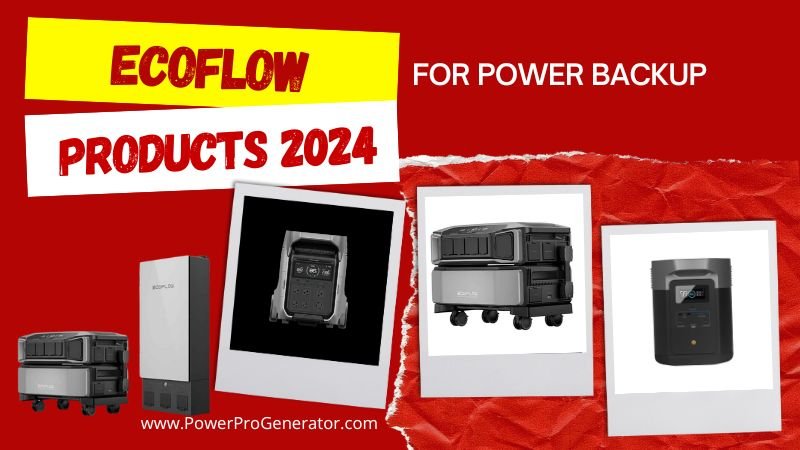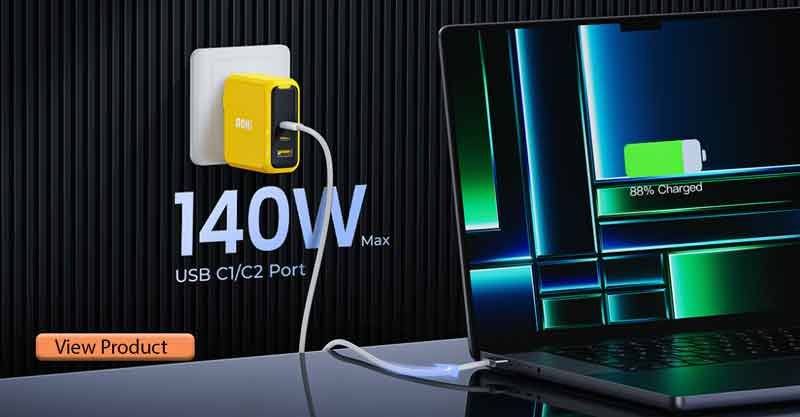Propane Generator For Home: The Ultimate Backup Power Solution
Propane Generator For Home – Power outages can strike at any time, whether it’s due to a storm, grid failure, or maintenance issues. When the lights go out, having a propane generator for a home can be a game-changer. But why choose propane over gasoline, diesel, or solar?
In this guide, we’ll break down everything you need to know about home propane generators, from how they work to their benefits, costs, and installation. By the end, you’ll know whether a propane-powered backup generator is the right choice for your household.
What Is a Propane Generator?
A propane generator is a backup power source that runs on liquefied petroleum gas (LPG). Unlike gasoline or diesel generators, propane models offer cleaner energy, longer shelf life, and greater efficiency in certain conditions.
How Does a Propane Generator Work?
Propane generators function similarly to other fuel-based generators but with key differences:
- Fuel Combustion: Propane is stored in tanks and fed into the generator’s engine.
- Power Conversion: The engine burns propane to produce mechanical energy, which is then converted into electricity via an alternator.
- Automatic or Manual Operation: Some models start automatically during outages, while others require manual activation.
Benefits of a Propane Generator for Home Use
Why should you consider a propane home generator over other types? Here are the top advantages:
- Cleaner Burning Fuel
Propane produces fewer emissions than gasoline or diesel, making it an eco-friendly generator option. - Longer Fuel Shelf Life
Unlike gasoline, which degrades in months, propane can last years when stored properly. - Lower Maintenance
Propane burns cleaner, reducing carbon buildup in the engine, meaning fewer maintenance headaches. - Reliable in Cold Weather
While diesel can gel in freezing temperatures, propane remains stable, making it great for winter power outages. - Quieter Operation
Compared to diesel generators, propane models tend to run much quieter, which is great for neighborhoods.
Types of Propane Generators for Homes
Not all propane generators are the same. Here’s a breakdown of the main types:
- Portable Propane Generators
- Best for temporary power needs (camping, short outages).
- Lower wattage (1,000–7,500 watts).
- Requires manual setup.
- Standby Propane Generators
- Permanent installation with automatic startup.
- Powers the entire house (10,000–50,000 watts).
- Connects directly to a large propane tank.
- Inverter Propane Generators
- More fuel-efficient and quieter.
- Ideal for sensitive electronics (laptops, medical devices).
How to Choose the Right Propane Generator for Your Home
Picking the best propane backup generator depends on several factors:
- Power Requirements (Wattage Needed)
- Calculate your essential appliances (fridge, lights, sump pump, etc.).
- Add up their starting & running watts to determine generator size.
- Runtime & Fuel Efficiency
- Smaller portable units may run 8–12 hours on a 20-lb tank.
- Standby generators can last days with a large propane tank.
- Automatic vs. Manual Start
- Automatic standby generators kick in within seconds of an outage.
- Portable models require manual fueling and startup.
- Noise Levels
- Inverter generators are the quietest (50–60 dB).
- Conventional models can be louder (65–75 dB).
Propane Generator Installation: What You Need to Know
Installing a home propane generator isn’t a DIY job for most people. Here’s what’s involved:
- Permits & Local Codes
Check local regulations—some areas require permits for standby generators. - Proper Placement
- Must be at least 5 feet from windows/doors (prevents CO poisoning).
- It should be on a level, stable surface (a concrete pad is recommended).
- Connecting to a Propane Tank
- Small portable generators use 20-lb tanks (like BBQ grills).
- Standby units need a large underground or above-ground tank.
- Electrical Hookup
It requires a transfer switch to connect safely to your home’s wiring.
Propane Generator Maintenance Tips
To keep your propane-powered generator running smoothly:
- Regular Oil Changes
Just like a car, generators need fresh oil every 50–100 hours of use. - Battery Checks (For Standby Models)
Ensure the battery is charged for automatic startups. - Fuel System Inspection
Check propane lines for leaks or blockages. - Test Runs
Run the generator monthly for 10–15 minutes to keep it in good shape.
Propane Generator Safety Precautions
Safety should always come first with home backup generators:
- Carbon Monoxide (CO) Risks
- Never run a generator indoors (including garages).
- Install CO detectors near sleeping areas.
- Proper Ventilation
Always operate in an open, well-ventilated space. - Fire Safety
Keep flammable materials at least 3 feet away.
Propane Generator vs. Gasoline, Diesel & Solar
How does propane stack up against other backup power options?
| Features | Propane | Gasoline | Diesel | Solar |
|---|---|---|---|---|
| Fuel Shelf Life | 10+ years | 6–12 months | 1–2 years | N/A |
| Emissions | Low | High | Medium | Zero |
| Noise Level | Moderate | Loud | Very Loud | Silent |
| Cost to Run | Medium | High | Medium-High | Low |
How Much Does a Propane Generator Cost?
The price of a home propane generator varies widely:
- Portable: 2,500
- Standby: 10,000+ (including installation)
- Propane Tank: 2,500 (depending on size)
Best Propane Generators for Home Use
1. Champion Power Equipment 11000-Watt
- Brand: Champion Power Equipment
- Power Source: Fuel Powered
- Item Weight: 205.1 Pounds
- Output Wattage: 9000
- Special Feature: Portable, Electric Start, Dual Fuel, CO Sensor
- Included Components: Engine Oil, Propane (LPG) Hose, Wheel Kit
- Color: Yellow
2. Generac Guardian 24kW Home Standby Generator
- Brand: Generac
- Wattage: 24000 watts
- Fuel Type: Natural Gas or LP Gas
- Power Source: Natural Gas or LP Gas
- Recommended Uses For Product: Residential use
- Item Weight: 455 Pounds
- Voltage: 240 Volts (AC)
3. Westinghouse WGen9500DF Portable Generator
- Brand Name Westinghouse
- Included Components: Battery Charger, Warranty, LPG Regulator, Quick-Start Guide, Engine Oil & Funnel, Key FOB, Owner’s Manual
- Model Name: Open Frame Generators
- Runtime 12 hours
- Total Power Outlets 6
- Frequency 60 Hz
- Tank Volume 6.6 Gallons
- Engine Displacement 457 Cubic Centimeters
- Starting Wattage 12500 Watts
- Running Wattage 9500 Watts
- Voltage 120 Volts
- Output Wattage 12500
- Additional Features: Electric Start, Automatic Voltage Regulation, Hour Meter, Dual Fuel, Fuel Gauge
- Engine Type 4 Stroke
- Ignition System Type: electric start
- Wattage 9500 watts
- Fuel Type Electric
- Power Source: Fuel Powered
- Recommended Uses For Product: Residential
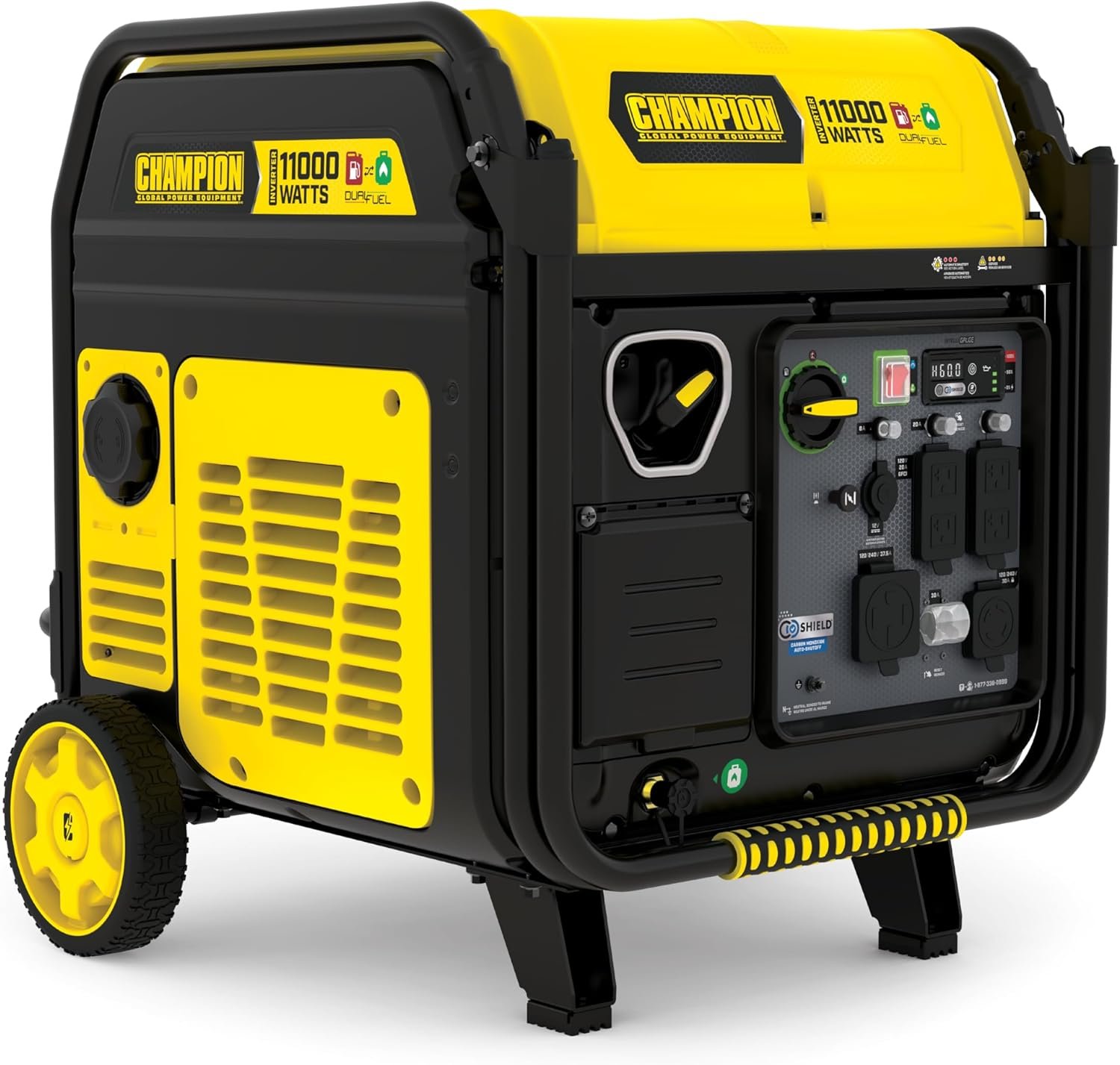 |
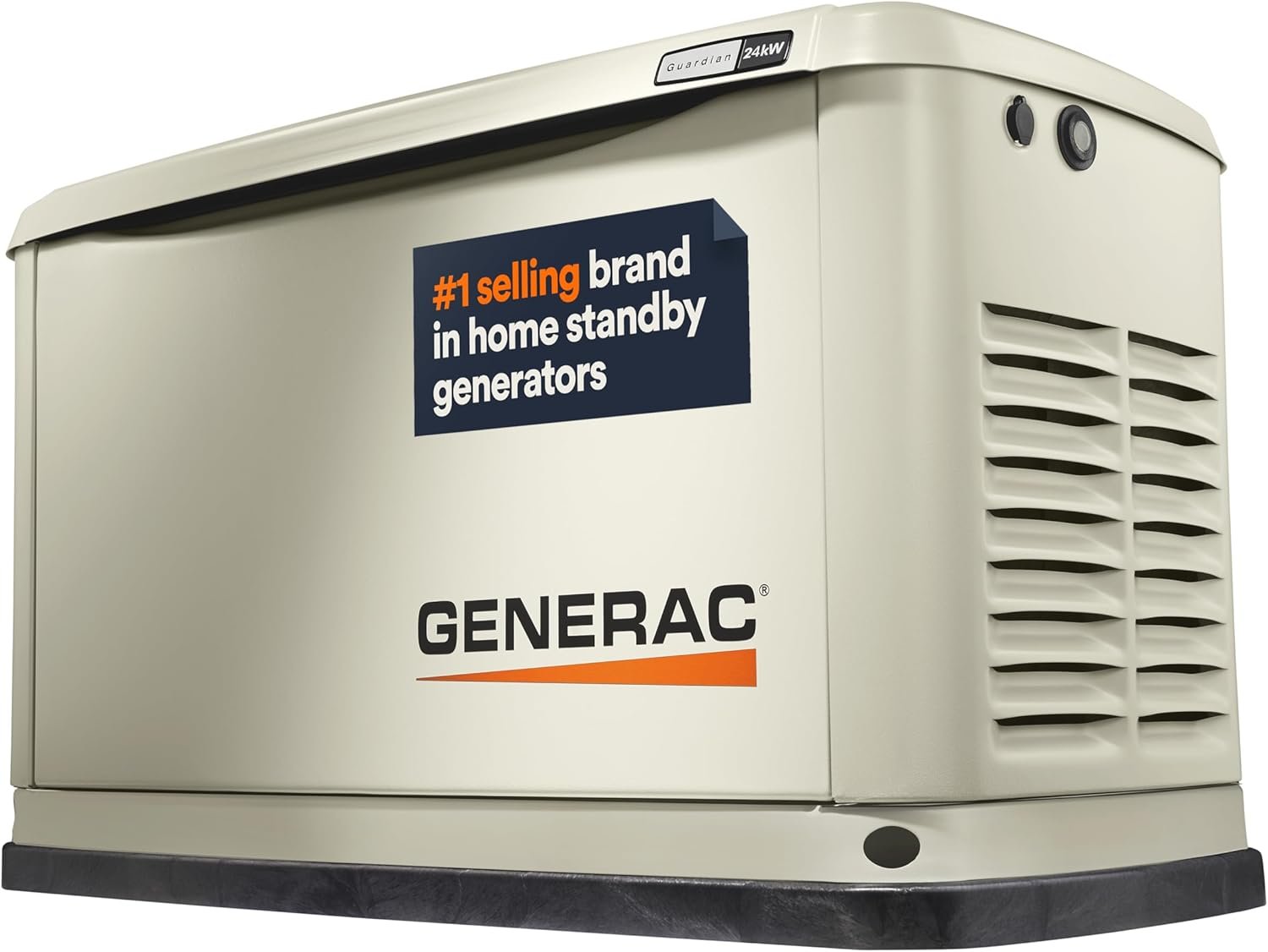 |
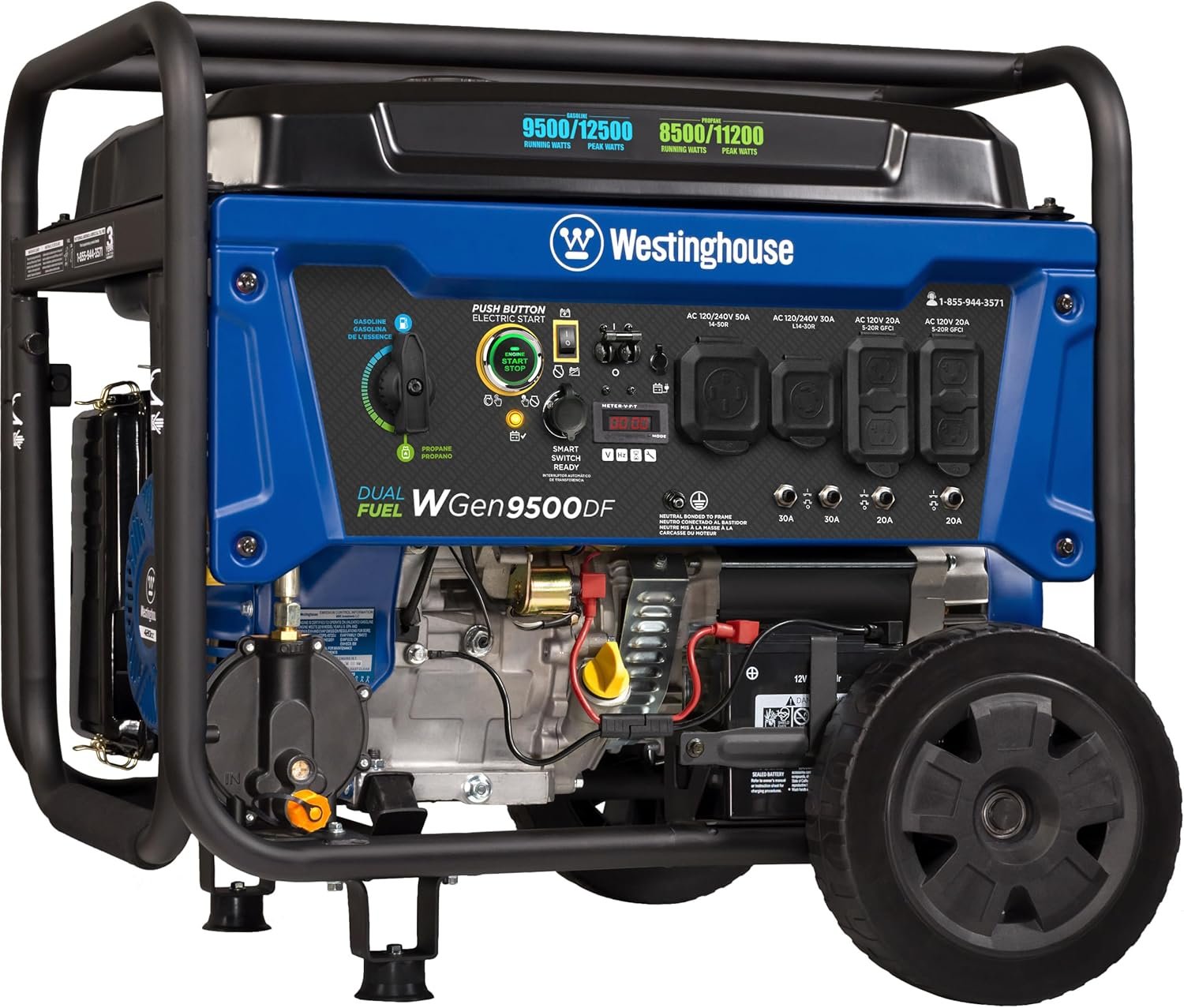 |
|
| Champion Power Equipment 11000-Watt | Generac Guardian 24kW | Westinghouse WGen9500DF Portable Generator | |
| View Product | View Product | View Product | |
| Price | $1909.99 | $5831.16 | $1049 |
| Power | 11,000 watts | 24kW | 9500 watts |
| Transfer Switch | Not Included | Not Included | Not Included |
| Home Size | 1501-2500 Square Feet | 2500+ Square Feet | 0-1500 Square Feet |
Conclusion
A propane generator for the home is a smart investment if you want reliable, clean, and long-lasting backup power. Whether you opt for a portable model for short outages or a whole-house standby system, propane offers fuel stability, lower emissions, and quiet operation.
Before buying, calculate your power needs, compare fuel options, and consider installation requirements. With the right setup, you’ll never have to worry about blackouts again!
FAQs About Propane Generators
- How long will a propane generator run on a 20-lb tank?
A typical 5,000-watt generator runs 8–12 hours at 50% load. - Can a propane generator power a whole house?
Yes, standby propane generators (20kW+) can power an entire home. - Is propane cheaper than gasoline for generators?
Propane is often more cost-effective long-term due to fuel stability. - Do propane generators need electricity to start?
Portable models start manually, while standby generators use a battery for automatic startup. - Are propane generators safe indoors?
No! Always run propane generators outdoors to prevent CO poisoning.
You Might Also Like:
- Best Dual-Fuel Inverter Generator
- Power Generator 1800
- SolarPlay 2400W Power Station
- Massimo Portable Power Station 300W
- DieHard 2400 Watt Portable Power Station









